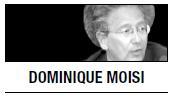PARIS ― From Hong Kong to Sao Paulo, and all points between, one word dominates all others among big investors: Greece. Will the Greeks remain in the eurozone? What will happen to the European Union and the global economy if they do not?

Until recently, Europe was a sort of mirror that confirmed for the major emerging economies the spectacular nature of their own success. They could contrast their high growth rates with Europe’s high levels of debt. They could oppose their “positive energy” with the pessimism dominating European minds. They were only too willing to advise Europe to work harder and spend less, as legitimate pride mingled with an understandable desire to settle historical scores and attenuate their legacies of colonial submission and humiliation.
But, today, emerging countries are growing very concerned with what they rightly perceive as the serious risks to their own economies implied by excessive weakness in Europe, which remains the world’s trade leader. Moreover, Europe’s malaise threatens many of these countries’ political stability as well, given the close connection ― especially in China ― between the legitimacy of existing arrangements and the continuation of rapid economic growth.
If the crisis in Europe were to cause annual GDP growth to fall below 7 percent in China, 5 percent in India, and 3 percent in Brazil, these countries’ most vulnerable citizens would be hardest hit. They were never part of the “culture of hope,” based largely on material success, that played a key role in these countries’ success. If social inequalities were to reach new heights, their frustration and resentment could manifest itself fully.
In that case, Europe could suddenly become a very different mirror for emerging countries, revealing, if not accentuating, their own structural weaknesses. And that is why, just as Europe must save the Greek economy or Spain’s banks at all costs, emerging countries must do whatever they can to contribute to the rescue of the European economy. As Europe has learned, the longer one waits, the higher the cost ― and the lower the chance of success.
Unfortunately, a group of countries that are united above all by a common denial of their global responsibilities is unlikely to reach such a conclusion. Indeed, most emerging countries would balk at the idea of coming to Europe’s financial rescue for several reasons.
First, there is no such thing as a bloc of emerging countries. They are not united by a common vision of their future, or by a common political ideal, such as democracy in the Western world. Whatever the limits or contradictions of shared values, it would be naive to dismiss their importance. Europe and the United States will remain allies even if Barack Obama, like Nicolas Sarkozy in France, turns out to be a one-term president.
Second, emerging countries are more Europe’s rivals than its partners. They are united only by their shared suspicion of China. In such a context, a common long-term strategy is extremely difficult to conceive.
The Chinese may proclaim that they tend to think over a “longer” term than Americans, who think more “broadly,” and Europeans, who think more “deeply,” as a well-known Chinese international relations expert has put it. But, when it comes to the European financial crisis, China’s behavior seems to be determined by purely short-term tactical considerations, even as Chinese investments in Europe tripled in 2011. To buy half of the Piraeus harbor at a knockdown price may seem more advantageous than investing in the long-term consolidation of the Greek economy and its finances, but is that really the case?
Third, emerging countries’ short-term opportunism is based on a double distrust: towards Europe, of course, but also, paradoxically, towards themselves. That is, they lack confidence in their ability to do their part to save the sick man of the global economy that Europe has become.
To be sure, this runs counter to the triumphalism emanating from Asia, in particular. Kishore Mahbubani, a leading foreign-policy thinker from Singapore, recently proclaimed in Vienna, at a conference organized by my institute, that the next millennium would be Asian. And yet one senses among elites from emerging countries something akin to existential doubt, which the European crisis has served to reinforce. This insecurity manifests itself in many ways: from the accumulation of liquid wealth as insurance against foreign and domestic uncertainties to the choice of many, if not most, to educate their children abroad.
In fact, the sick man ― undeniably European, if not Western ― could reveal himself to be more resilient, owing to the strength of his own natural defenses: democracy and the rule of law. That is why the current European crisis may well prove to be a crucial test for emerging countries that are more dynamic than Europe economically, but ultimately more fragile politically.
By Dominique Moisi
Dominique Moisi is the founder of the French Institute of International Affairs and a professor at Institute d’Etudes Politiques in Paris. He is the author of “The Geopolitics of Emotion: How Cultures of Fear, Humiliation, and Hope are Reshaping the World.” ― Ed.
(Project Syndicate)








